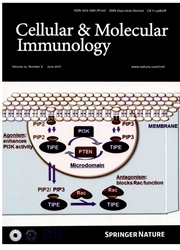

 中文摘要:
中文摘要:
在在为 T 房间有免疫力的回答处理和细菌的抗原的表示的巨噬细胞和树枝状的房间之间的相互影响仍然保持糟糕理解。用 Listeria monocytogenes (Lm ) 感染模型,我们证明树枝状的房间(DC ) 要求巨噬细胞的支持对 Lm 感染得到保护的免疫。DC 自己在收起 Lm 是低效的但是能够收起感染 Lm 的巨噬细胞释放的 microparticles (MP ) 。这些 MP 把 Lm 抗原转移了到 DC,允许 DC 介绍 Lm 抗原给受动器 T 房间。调停 MP 的 Lm 抗原转移要求了 MHC 一级参予,自从在巨噬细胞的 MHC 一级缺乏导致了 T 房间激活的重要减小。而且,有从感染 Lm 的巨噬细胞的 MP 的老鼠的种痘对 Lm 感染生产了强壮的保护的免疫。我们这里在 Lm 感染期间识别在巨噬细胞和 DC 之间的一个内在的抗原转移节目,并且强调巨噬细胞也在得到 DC 的 Lm 特定的 T 房间回答起一个必要作用。
 英文摘要:
英文摘要:
Interplay between macrophages and dendritic cells in the processing and presentation of bacterial antigens for T-cell immune responses remains poorly understood. Using a Listeria monocytogenes (Lm) infection model, we demonstrate that dendritic cells (DCs) require the support of macrophages to elicit protective immunity against Lm infection. DCs themselves were inefficient at taking up Lm but capable of taking up microparticles (MPs) released by Lm-infected macrophages. These MPs transferred Lm antigens to DCs, allowing DCs to present Lm antigen to effector T cells. MP-mediated Lm antigen transfer required M HC class I participation, since M HC class I deficiency in macrophages resulted in a significant reduction of T-cell activation. Moreover, the vaccination of mice with MPs from Lm-infected macrophages produced strong protective immunity against Lm infection. We here identify an intrinsic antigen transfer program between macrophages and DCs during Lm infection, and emphasize that macrophages also play an essential role in DC-elicited Lm-specific T-cell responses.
 同期刊论文项目
同期刊论文项目
 同项目期刊论文
同项目期刊论文
 期刊信息
期刊信息
